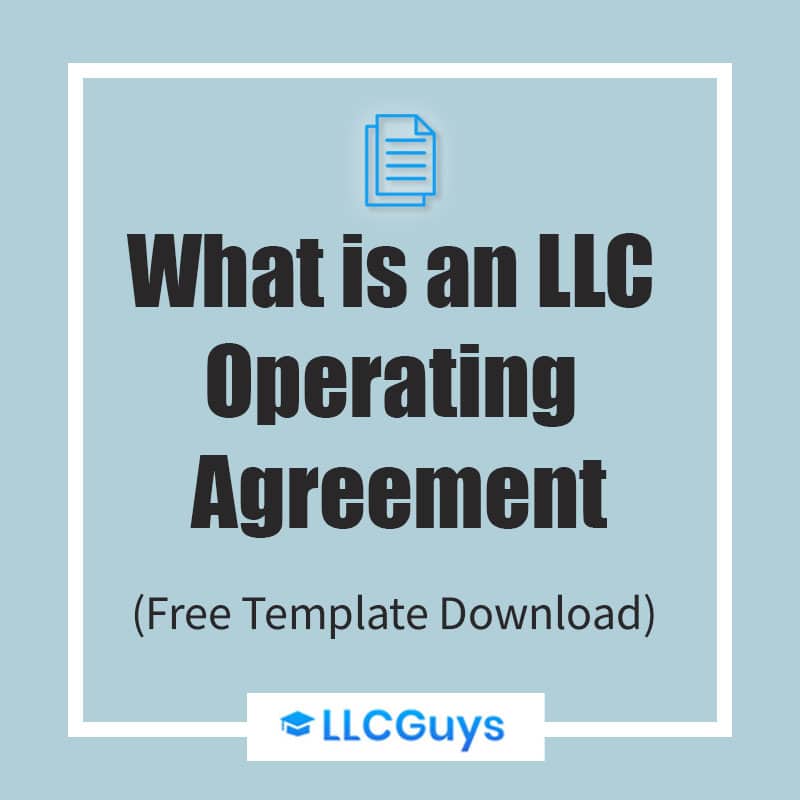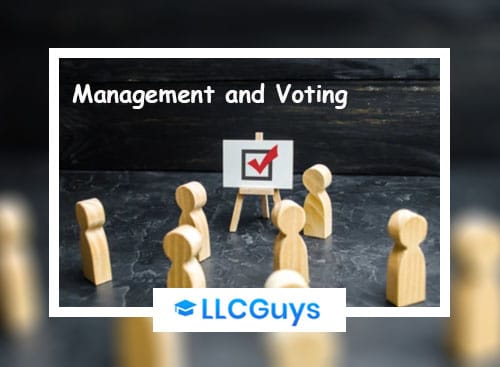LLC Operating Agreement (Free Template Download) – What Is It & Do You Need It?
Get Professional Help in Forming an LLC & Writing an Operating Agreement

Every LLC needs an operating agreement, whether it is required or not. Essentially, an operating agreement is a document that provides clarity about how a business works. Getting into a business with other people can be a very complicated process, and without some guidelines in place, it can easily spiral into issues later down the line if there are any internal disagreements. When everything is put down in writing, the agreement can be referenced if any conflict occurs.
- Get Professional Help in Forming an LLC & Writing an Operating Agreement
- What is an Operating Agreement?
- Is Operating Agreement Necessary and Required?
- Why do You Need an Operating Agreement?
- Dangers of Writing an Operating Agreement Yourself
- How to Write an Operating Agreement (6 Steps)?
- What to Do When You Have Finished Writing Your Operating Agreement ?
- Get Professional Help to Form an LLC (With Operating Agreement) for You
- What Happens If You Don’t Have an Operating Agreement?
- Download a Free Operating Agreement Template
- References & State Laws
What is an Operating Agreement?
An operating is a key component to setting up an LLC. It outlines all the business’ financial and functional decisions.
Once the operating agreement has been signed by the members of the LLC, then it acts as an official contract that binds them to its terms, which is why it is so important that it is written correctly and accurately. It is worth spending the time, and potentially the money, to get it right.
Is Operating Agreement Necessary and Required?
It’s recommended to have the Operating Agreement on all cases, but it’s not mandatory in all states. Required States – it is required in California, Delaware, Maine, Missouri, and New York. So obviously, not all states require that.
Why do You Need an Operating Agreement?
Many states require an LLC to have an operating agreement. If you are forming an LLC in California, Delaware, Maine, Missouri, Nebraska and New York, you are legally required to have an operating agreement. However, even if you are forming an LLC not in one of these states, it is still strongly recommended that you have one. There are several reasons why your business should have an operating agreement.
1. Avoids Company Problems

This is especially true if you have business partners, as an operating agreement can help to prevent misunderstandings in the future as it sets out any clear expectations about the roles and responsibilities of the partners. Many people go into business with people they are close to, therefore are not as guarded as they may be with other business partners, so to remain friends and family after a business disagreement, everything should be written down in black and white.
Also, if you are the sole owner of an LLC, it helps to bring the business credibility and helps to ensure the courts uphold the limited liability status of your LLC.
2. Protects Liability

An operating agreement can also help to protect its members from liability. In all operating agreements, there should be a liability and indemnification clause which states that the members of the company have limited liability for the actions they take on behalf of the company. One of the main reasons you form a limited liability rather than a sole proprietorship is to protect your personal assets, however, without an operating agreement, the courts will sometimes just treat your business like a sole proprietorship anyway.
2. Flexibility

Using an operating agreement, you can have the flexibility to decide how you want to profit along with the ownership structure of your LLC. You can set it up completely your own way.
3. Don’t go by Default

If your business doesn’t have an operating agreement, such as if the LLC has been formed in a state that doesn’t require one, it will be managed by the state’s default rules. These rules vary from state to state, and there is a good chance you won’t like the default rules they have in place. For example, if you have put a lot more time and funds into the company as a business partner, yet the state says you have to split the assets evenly when the LLC dissolves, you may not be too happy.
Other Factors
Although it is not strictly required in all states, it is pretty risky to run an LLC without one. You are exposed to liability and could lead to many problems when it comes to ownership and the rights of its members.
Even if the estate doesn’t require you to have an operating agreement, that doesn’t mean that other places won’t want to see one. Most banks will want to see an operating agreement before you can open a business bank account, as well as potential investors or business partners.
Dangers of Writing an Operating Agreement Yourself
It is possible to write an operating agreement yourself, but there are some problems with this that you should be aware of before deciding to do it on your own. Even if you are following a guide, without being in the know it is easy to miss out important sections or write the operating agreement inaccurately.
In some cases, making a mistake on an operating agreement can result in time consuming corrections and changes. In worst case scenarios, it can even result in a contentious legal disagreement, and in even more extreme cases, can result in the collapse of the company completely.
It very common for these mistakes to occur if you have written your operating agreement yourself, especially if you are eager to get the business going as quickly as possible. It is for this reason that corners can be cut. It can also be to do with money, as new business owners can be strapped for cash and don’t want to lay out for someone in the know to write over or look over the operating agreement.
Be careful also if you are using a free template, as if it has not been written specifically for your business, it could easily be the wrong form, have missing language, or have language that is required by the state missing.
How to Write an Operating Agreement (6 Steps)?
Some agreements are going to be much longer and much more complicated than others, as it depends on the type of business you are writing it about, and how it is managed. All however, will be created using the same basic structure.
What must be included in an operating agreement?
Most agreements will contain a few key sections, the organization of the business, management and voting, capital contributions, distributions, membership changes and dissolution.
Step 1: Organization

The first section is all about the business and its organization. This is where the membership of the LLC is really covered in detail. It tends to cover:
Step 2: Contributions and Interest

There should be a section that focuses on the how different members join the LLC and their contributions to the business. It should also outline how the profits and losses are distributed to each of its members. This section should include:
Members of an LLC tend to contribute either time, money or both to the business. If these assets of value are contributed, then an accountant should be used to keep track of what each member has financially contributed to the LLC. If the member is only contributing skills, time or knowledge, then it doesn’t have to be monetarily quantifiable.
Step 3: Management and Voting

The second part of the operating agreement usually will cover the management of the LLC and voting. It will discuss how its members can vote about business related issues. Businesses are able to choose from having all company decisions made via a voting process. If this is the route the company is going to go down, then the operating agreement would outline how the voting process would work. Another option is for the business to have the members appoint a single or multiple managers, and it is the role of the operating agreement to establish this authority.
There are two options when it comes to the management of an LLC. An LLC could either be:
- Member-managed, or have a
- hired manager (manager-managed), who is an employee of the business.
Unless it is a very small business, it is usually best to designate one person to manage the business, whether that is a member or a manager.
Step 4: Allocation of Profits, Losses and Distributions

The distribution of profits can get complicated, and the operating agreement is used to outline how this takes place. Although the easiest way to determine this is based on your members’ ownership percentages, it doesn’t necessarily have to be. You could use an operating agreement to offer funds to those who are more involved in the business, or a range of other factors.
Step 5: Buyout and Buy-Sell Rules

As a business develops, it is not uncommon for the members to change overtime. To make this a smoother transition, your Operating Agreement should detail the process for buyouts and sales of ownership portions of the LLC. Essentially, the operating agreement should delineate who can buy a percentage of the business. If this isn’t outlined, then you will have less control over who takes over a member’s ownership portion should they leave the company.
Step 6: Leaving or Ending the LLC

This is the section that outlines what the process is when a member leaves the LLC, and about what happens when the business ends. For example, it can talk about how a member can be asked to leave the LLC and how a member can leave. It can also outline how the business can buy back the member’s interest, the process of transferring a member’s interest and the liquidation procedures.
What to Do When You Have Finished Writing Your Operating Agreement ?
Once you completed your operating agreement, depending on the state, it may need to be filed with your articles of organization as part of the state’s LLC formation procedures. If you are not forming an LLC that requires an operating agreement, you should file it with your records and give a copy to all the other members of your LLC.
If your company goes through any major changes at any point in the future, such as if a member is lost or added, you should review the operating agreement and make any necessary changes or adjustments, as long as you have the consent of all current members.
Get Professional Help to Form an LLC (With Operating Agreement) for You
If you don’t have the time or the knowledge to write an operating agreement yourself, there are companies that can do the hard work for you for a small fee. In the long run, this fee will be well worth it, as you can rest assured it will be written correctly and will not cause any problems further down the line.
Zenbusiness is a good option when it comes to finding a company to create your operating agreement. The company tailors their service to you and your business, ensuring your interests are protected and your company is properly supported as it grows. Zenbusiness is one of the top-rated business formation services in the industry, helping literally thousands of businesses since its founding, with some incredible online reviews.
What Happens If You Don’t Have an Operating Agreement?
It is true, not all states require you to have an operating agreement in order to start an LLC. If you decide to skip this part when starting a business, for whatever reason, you will have to look to the statute in your specific state to see to see what your rights are when a when an issue arises between business owners. If you don’t agree with the state’s laws, at this point, there is nothing you can do about it. Therefore, it is important that you take the time to get this document sorted before it gets to this point.
Download a Free Operating Agreement Template
Although, we recommend using professional help to form an LLC and its’ Operating Agreement for you, but if you want, we’re happy to help. Here you can download a few Operating Agreement templates based on the type of LLC you have:
References & State Laws
- Alabama – § 10A-5A-1.08
- Alaska – AS 10.50.095
- Arizona – § 29-3105
- Arkansas – § 4-32-405
- California – Corp Code 17701.10
- Colorado – § 7-80-108
- Connecticut – § 34-243d
- Delaware – § 18-101 to § 18-1109
- Florida – § 605.0105
- Georgia – Title 14, Chapter 11
- Hostelling International USA – § 428-103
- Idaho – § 30-25-105
- Illinois – 805 ILCS 180/
- Indiana – IC 23-18-4-4
- Iowa – § 489.110
- Kansas – § 76-7672
- Kentucky – § 275-180
- Los Angeles – RS 12:1319
- Maine – § 31-1521
- Maryland – § 4A–402
- Massachusetts – Chapter 156C
- Michigan – § 450.4308
- Minnesota – § 322C.0110
- Mississippi – § 79-29-123
- Missouri – § 347.081
- Montana – § 35-8-109
- Nebraska – § 21-110
- Nevada – NRS 86.286
- New Hampshire – § 304-C:41
- New Jersey – § 42-2C-11
- New Mexico – § 53-19-19
- New York – § 417
- North Carolina – § 57D-2-30
- North Dakota – § 10-32.1-13
- Ohio – § 1705.081
- Oklahoma – § 18-2012.2
- Oregon – § 63.057
- Pennsylvania – § 8916
- Rhode Island – § 7-16-22
- South Carolina – § 33-44-103
- South Dakota – § 47-34A-103
- Tennessee – § 48-206-101
- Texas – Sec. 101.052
- Utah – § 48-3a-112
- Vermont – 11 V.S.A. § 4003
- Virginia – § 13.1-1023
- Washington – RCW 25.15.018
- West Virginia – § 31B-1-103
- Wisconsin – Chapter 183
- Wyoming – § 17-29-110




